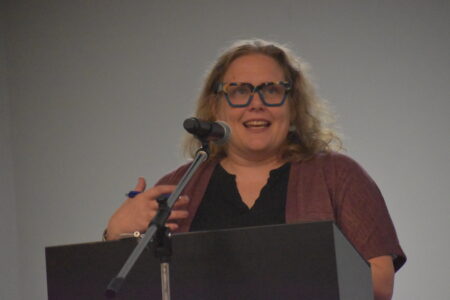Advocates Raise Alarm Over Health Care Cuts at Wheeling Town Hall

photo by: Eric Ayres
Elisabeth Burak, senior fellow at the Georgetown University McCourt School of Public Policy’s Center for Children and Families, speaks during Monday night’s Cuts and Consequences Town Hall at the Ohio County Public Library in Wheeling.
WHEELING — Advocates for affordable health care are sounding the alarm throughout West Virginia about potential impacts as a result of sweeping federal funding cuts that loom.
On July 1, President Donald Trump signed into law House Resolution 1 – known more commonly as the One Big Beautiful Bill Act — a budget reconciliation package. The massive bill was framed as a tool for deficit reduction and includes a $1.1 trillion in spending cuts over the next 10 years.
The law slashes federal contributions to Medicaid and the Affordable Care Act marketplaces. New work requirements and other eligibility thresholds are set to be implemented beginning next year.
Opponents to the One Big Beautiful Bill cuts to Medicaid, ACA benefits and other health initiatives say this will put at risk tens of thousands of West Virginians who rely on these programs.
In an effort to get the word out about these impending pitfalls to the cuts, West Virginians for Affordable Health Care and Catholic Charities West Virginia have joined forces to conduct Cuts and Consequences Town Hall meetings throughout the state this month.
The first of those meetings took place Monday night at the Ohio County Public Library. Another is scheduled to take place tonight in Morgantown, and one is slated for Wednesday in Princeton, W.Va.
Mark Phillips, CEO of Catholic Charities West Virginia, introduced expert panelists who are participating in the town halls.
Panelists noted that nearly one in three West Virginians rely on Medicaid for health care coverage today.
Elisabeth Burak, senior fellow at the Georgetown University McCourt School of Public Policy’s Center for Children and Families, indicated that taking $1 trillion away from health care could be devastating.
“Whether that’s Medicaid or not, that is an incredible chunk of money to take away from healthcare providers,” Burak said, noting that seven hospitals and three nursing homes in the state will be at risk of closure in the wake of the cuts. The pain could be worse at a number of rural hospitals, she added.
“We already have a lot of strain on our healthcare systems,” Burak said. “I think the main thing right now is we’re just trying to make sure the facts are out there about what we think is coming for Medicaid. By educating people and by having these conversations, they hope to let state and federal lawmakers know what the impact of these changes will be and to find a solution sooner than later.”
Some of the literature displayed during the town hall Monday referred to the Big Beautiful Bill as “#CapitoCare.” Burak said health care advocates are looking at many different means to address the potential impacts of the cuts, including political means.
“Perhaps it’s the best opportunity to reverse this before it gets even worse,” she said. “Some people are looking at midterms and the next election cycle, making sure everybody understands what is happening and what is coming.
“This is the biggest health care cut in the history of the country, and people’s health care needs aren’t going to go away.”
Jeremy Smith has worked for First Choice Services since 2015 and serves as the program director for the ACA Navigator program in four states, including West Virginia. The Navigator offers free, unbiased assistance to the community to help individuals figure out what kind of health care services they qualify for and help them get signed up.
Smith said this service was already ravaged by funding cuts.
“We were up to 41 staff, then two weeks ago, we got hit with a 90 percent funding reduction,” he said. “So that means, just for example here in West Virginia, we went from five office locations and 12 staff down to one office location and one staff. So this is a big thing. Out of 70,000 or so people who are enrolled in the marketplace in West Virginia, the Navigators help over 2,000 people a year sign up, and they are generally the most vulnerable members of the population.”
Smith said they will continue doing everything they can, but navigating the new rules with work requirements and other potential hurdles will be challenging enough, let alone with a fraction of staff members.
Panelists noted that although the Big Beautiful Bill passed by a slim majority split down party lines, lawmakers on both sides of the aisle have expressed concerns about cuts to Medicaid and to the health care safety net that will ultimately become a burden of the states once federal cuts are implemented.
“It does seem like some of our elected representatives may want to revisit these issues,” Smith said. “Hopefully meetings like this are our opportunity to say ‘we haven’t forgotten about this. Maybe you’re still thinking about it, too. Let’s do what we can to reverse some of this before it becomes too late.'”
Lisa Mowry is CEO for Change Inc., a program with a mission to build partnerships, consolidate resources and integrate services to empower families to overcome the causes of poverty and live healthy lives.
“People will lose coverage,” Mowery said. “Not because they no longer qualify, but because they can’t keep up with the paperwork or meet some of the other requirements.”
Mowery said Change Inc. is working on developing strategies to help patients navigate the process in the future toward eligibility determination, to help people applying for hospital waivers and to develop other ways to assist those in need.
Mariah Plante, child health advocate and engagement coordinator at West Virginians for Affordable Health Care, said she serves in many different roles — from child health advocator to artist, educator and caregiver for her brother, who is non-verbal autistic.
Plante said thanks to West Virginia’s Intellectual and Developmental Disabilities Waiver Program, she is able to care for her brother at home and receive financial assistance, as opposed to using a state-run hospital or facility. She said she is concerned, however, of the “trickle down” effects the cuts will have on other supporting services.
“I have the patience for it, as someone who loves him dearly and knows all of his special quirks and tricks that help get him through the day,” Plante said of her ability to care for her brother.
She said someone in a facility who may have a big case load of patients would never be able to get the same level of care. She added that in-home care support is far less expensive than what around-the-clock care in a state-run facility would cost.
Plante added that in rural communities, specialized care and even critical care should not be pushed further out of reach for those who need it. With the threat of hospital closures as a result of the cuts, the time it takes to get to the hospital could be precious.
“When it comes to real, precious time, life-death situations, we cannot have bureaucracy and red tape separating people from life-saving care,” Plante said.
For more information about the impacts to Medicaid and ACA cuts, visit wvahc.org





